As Acting Bombardier Richard Routledge carried out his duties on the Island in 1851 along with his fellow Gunners and a detachment of Infantry from the 4th (King’s Own) Regiment of Foot war was looming in the Crimea. Russia had been expanding over the previous centuries and now had borders with a weakening Ottoman Empire. Both Russia and France had conflicting aims and used access to Palestine and the protection of the Eastern Orthodox and Catholic minorities respectively which were under Muslim rule to try to influence the Ottoman Empire and achieve their strategic aims of expansion. Britain was concerned about trade with the Ottoman Empire and the sea route to the Empire in India which put them at odds with the Russians and meant a common interest with France. Whilst the British Navy was a dominant force the British Army would struggle to put an Expeditionary Force in the field after all other commitments were met whereas the French had the opposite problem.
On the Island Richard no doubt had concerns of his own, probably revolving around his courtship with Mary Ann Rowett and hoping he wouldn’t be deployed if war did break out. Mary Ann was born in 1833 at Kingsand, then a Devonian enclave within Cornwall on the Rame Peninsular and from her census entries always considered Kingsand part of Devon even after it became part of Cornwall in 1844. Richard was single so would have been in a Barrack room with up to 7 other Gunners on the Island. Each soldier would have had a bed with a straw mattress and there would have been a communal table and benches. His duties wouldn’t have given him much time off. The week would be either duties or drills, usually including Saturday morning and he would have attended the Church parade each Sunday. So his free time, if he wasn’t on duty would have been limited to Saturday and Sunday afternoons when he could court Mary Ann. The Island did have small boats which the Garrison used to get to Plymouth but it’s not clear how much access the soldiers had to them.
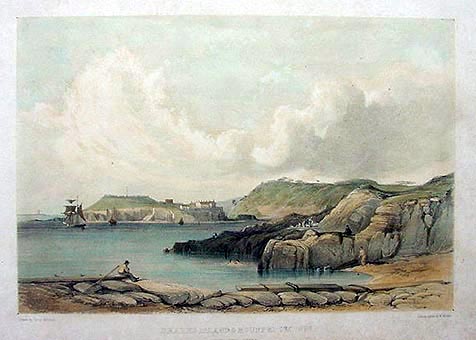
In late 1851 the 4th King Own detachment had been replaced by one from the 77th Regiment of Foot. On 3rd November of that year a local waterman Thomas Wright had been out in stormy weather when his boat overturned and drifted onto the rocks at the back of the Island. Three Privates from the 77th Michael Kavanagh, John Sullivan and Edward Farley saw what happened and effected a rescue of Thomas who was clinging to the mast of his boat. Once they had him safely on the Island they returned and bought in his boat and sails. With no insurance small boats, sails etc used for livelihoods were very valuable and if lost could lead to hardship for the owner. For their efforts the three soldiers were awarded £1 by the humane society. Storms and ships being stranded or broken up on the foreshore of the Island were not uncommon. A year later a newspaper report detailed how a summer storm dashed a London Barque against the rocks at the back of the Island and turned the streets of Plymouth into rivers.
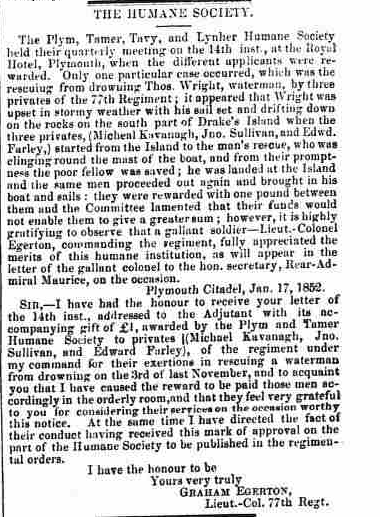
Richard was still in Plymouth in 1852 and he wed Mary Ann at East Stonehouse early that year. Military regulations of the time required a soldier to have served 7 years and have permission from their Commanding Officer before marrying although many soldiers ignored this and simply married whilst on leave. Richard would have served 6 years at this point but the fact he married at East Stonehouse, a military area suggests he did have permission and the CO would have latitude to grant permission earlier than the 7 year point. Their first child, William arrived in late 1852 and was born in Kingsand. I am guessing that Mary Ann went back to her parents home for the birth which could have been for any number or combination of reasons. As newly weds they may have been waiting for a military quarter or that their quarter was cramped and her parents home was a better option for the birth. William was born just before the first compulsory vaccine was introduced to the UK. From 1853 all babies had to be vaccinated against smallpox so all Richard and Mary’s subsequent children should have been vaccinated. Parents were liable to be fined if babies were not vaccinated within 3 months. By the end of the decade the death rate due to smallpox had fallen as 2/3rds of babies were vaccinated. As with the covid vaccination today however there was significant opposition and the first anti-vaccination leagues were formed. Objections varied but were mainly to do with religious, sanitary, moral or political views as well as a lack of trust in the science, religious views held much more sway back then. Some local clergy were prominent in leading anti vaccination movements and one march attracted around 80,000 objectors in Leicester. It wasn’t until 1971 that the programme ended as the disease had been eradicated.
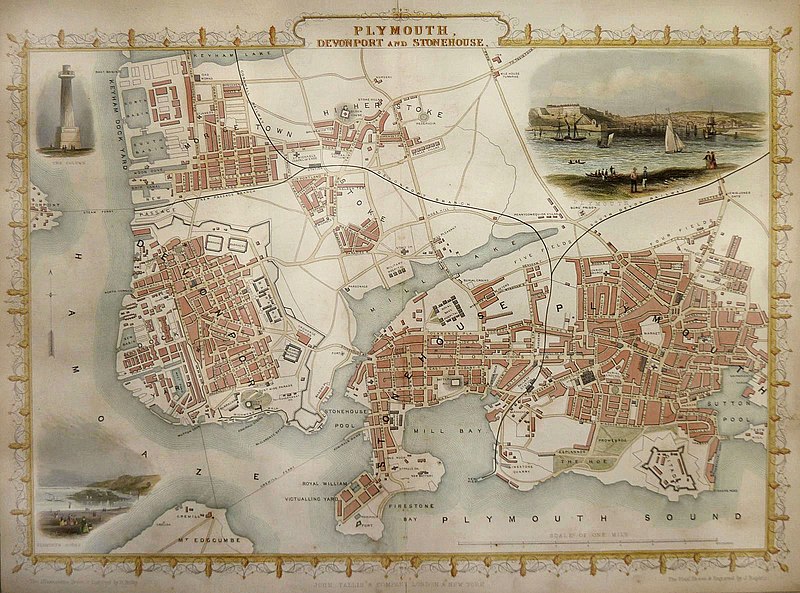
In Plymouth the 1851 census showed a rapid increase in population, from 21,000 in 1821 to 52,000. In 1852 this led to public inquiries about the water supply and sanitation especially as homes were becoming overcrowded and occupation rates were double the national average at 10 people per dwelling on average. Homes were supplied either every day or night on a rotating basis and a lack of stop cocks in the poorer homes meant that water was wasted. Not only maintenance but the creation of new reservoirs to increase capacity were discussed early in the decade especially as it was recognised that the effects of disease such as cholera would be magnified if nothing was done. Crownhill reservoir opened in 1852 whilst the Hartley reservoir opened in 1861 along with the first Dartmoor reservoir, Tottiford.
Internationally by 1853 tensions in the Ottoman Empire had been rising and after Russia attempted to force the issue by invading Britain and France declared war, more to contain Russia rather than in any meaningful support of the Ottoman Empire. By mid 1853 the Island was garrisoned only by the Royal Artillery, possibly as the Army was stretched finding enough infantry for an Expeditionary Force to deploy to the Crimea. Richard was not deployed but was promoted to Bombardier then Corporal in 1854 which would have seen a welcome increase in pay for the newly weds. Unfortunately Richard was medically discharged as unfit for service a few months later in August of 1854. The official reason was spitting blood and Richard applied for and was granted a pension. It was a temporary pension paid at 6d a day to the end of 1855. Although there appears to be no connection to either Richard or Mary his pension record shows the family went to live in Great Yarmouth where their second child, John was born in 1855. However by the end of the year Richard was back in Plymouth and had enlisted in the Devon Artillery Militia as a full time reservist. Whether this was because his pension was ending and he couldn’t find other suitable work, he had a trade as a weaver before he enlisted in 1848, or for another reason I don’t know. At the time the British Army was struggling to fulfil its commitments and the Militia were often deployed in support of expeditionary forces abroad as well as be expected to maintain the Home defence commitment. It is possible that Richard was seen as capable of fulfilling a home defence role for the militia or that as his pension was ending he could be reassessed medically.
By the time Richard was back in Plymouth a tender to build the Sea Wall at the back of the Island facing towards the Rame Peninsular and Breakwater had appeared in the local papers and been awarded. In the Three Towns the Keyham Steam Dockyard and North Dock at the Devonport was complete. The Three Towns were expanding as people gravitated to the towns from the countryside putting pressure on the workhouses which were becoming overcrowded. New workhouses in both Plymouth and Devonport were constructed and opened by 1854 for 700 and 500 inmates respectively. Stonehouse hadn’t expanded as rapidly and didn’t build a new workhouse. The workhouses, paid for by ratepayers and managed locally, could accommodate the poor, aged, infirm and mentally ill. This would include unaccompanied children and families. There was a school and infirmary and often gardens for growing vegetables. Education was designed to help provide employment so inmates could leave and provide for themselves. Sundays would have included compulsory Divine Worship. It didn’t mean the workhouses were either well run or maintained, the Devonport workhouse, later the Ford House Assistance Institution, had broken toilets and there was no separation of the sexes within a year of opening. In the Crimea Russia was isolated in the War which led to peace talks and the war ending in 1856 with a Russian defeat despite the mismanagement of the War by both the British and French. During the same year Mary Ann gave birth to their third child and first daughter Mary Jane back in her parents house at Kingsand.
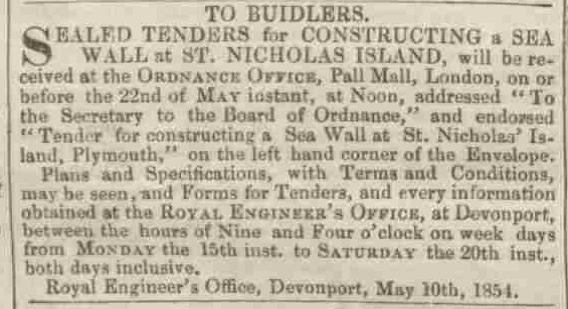
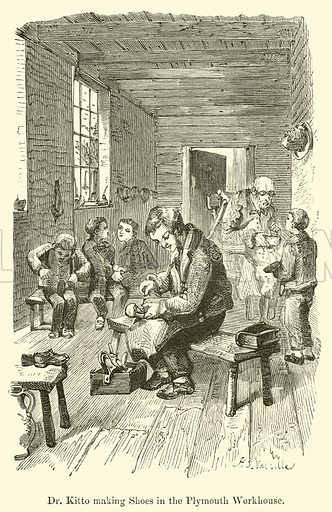
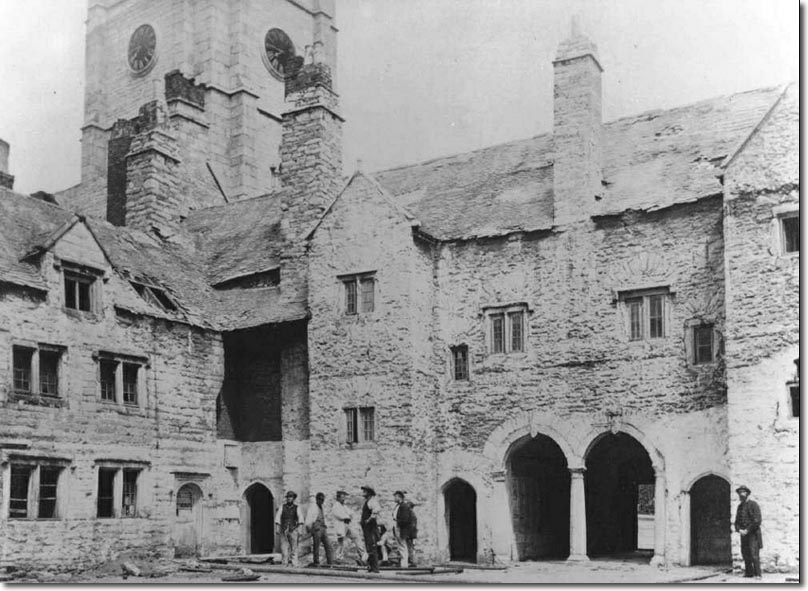
Uniquely at this point the Island had a detachment of Germans from No 3 or No 6 Company of the 3rd Jaeger Corps, the reports are a bit at odds with each other. The Jaeger Corps were recruited from the German Confederation as the British German Legion to fight in the Crimean War and were due to be disbanded in 1856 as the war had ended. Part of their contract was that Great Britain would cover the cost of repatriating them home. However in Plymouth there was unrest and some of the Jaeger Corps mutinied including No 6 Company who were either at Bovisand or on the Island. The mutiny was over within a day and was not violent but a refusal to obey orders. The Corps disbanded as planned. The men either took free passage to the German Federation or the Americas although some worked their way to South Africa.
A major uprising against British rule in India a year later in 1857 when after a series of incidents Indian soldiers of the British East India Company mutinied. The mutiny which quickly spread and became an uprising throughout India was put down by force and was over in 1858. Some of the soldiers who had been garrisoned on the Island at the time of the previous census in 1851 and served with Richard on the Island were in India as the mutiny broke out and involved in the subsequent efforts to subdue it. In 1859 the situation was still unstable and the Island was used, along with other barracks in the Three Towns to house the 1,000 strong reinforcement force waiting to sent to India. Part of the Hampshire Artillery were housed on the Island until they were taken off by the Paddlewheel steam sloop Virago in June.
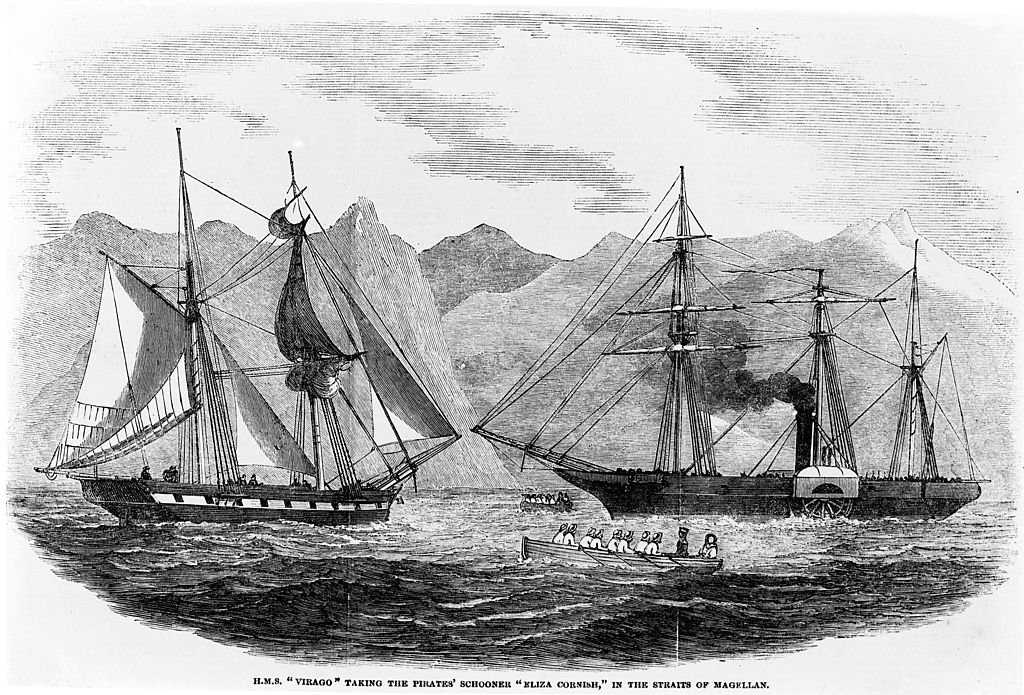
The five strong Routledge family were housed in Devonport by now and their fourth child Emily Emma was born there in 1859. By now Richard was a SNCO working at the HQ in the Quartermasters department which dealt with the stores and supplies needed by the men and guns. The Barracks throughout the Three Towns including on the Island were supplied by civilian merchants using a sealed bid tender process. Fuel and light – coal, coke and candles – on a yearly basis. Bread, meat and forage were tendered for quarterly, oil lamps, chimney sweeping (mechanically), cleaning the toilets and providing privy soil and ash (they were dry toilets), washing and repairing bedding was a three year contract whilst supplying straw for paillasses (mattresses) were a 6 month contract. Once the contracts were awarded it would be the responsibility of the Quartermasters department at each Barracks to ensure the contracts were met by the merchants. Richard would have been involved to some extent in overseeing the contracts. Richard and the Quartermasters Department would have been quite busy as in addition to overseeing the contracts there was Gun Practice and recruits for at least 13 dispersed militia companies to be supported throughout Devon – 6th Dartmouth, 10th Salcombe and 12th Devonport dockyard for example – which were continually recruiting especially where the company was raised as part of a workplace. 13th Keyham was newly raised in 1860 and would be required to be kitted out.
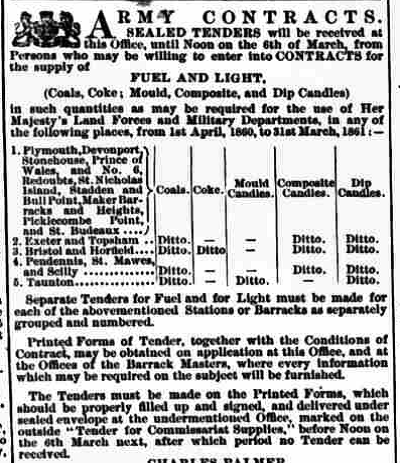
1859 saw the launch of the first Ironclad warship by the French and a leap in Artillery technology to the first rifle muzzle loaded guns. The French under the Emperor Louis Napoleon, Napoleon Bonaparte’s nephew had gone from Allies against the Russians in 1853 to a threat to peace in Europe by 1859. In response to the potential French threat a Royal Commission into the defence of the United Kingdom was set up and visited the Island as part of the investigation in 1859. It found the Island fortifications dilapidated and other forts defending Devonport in poor repair. They also noted a number of weak points and found there were gaps in the defences. The findings led to the start of the large Palmerston Fort building programme, over 180 new or upgraded fortifications from Hartlepool on the East coast down to and along the South coast and up as far as Haverford West in Wales.
Back in the Plymouth railway lines through to Cornwall and up to Tavistock had also been completed in 1859 connecting the town to other centres in the South West. The Cornwall line required the building of the Royal Albert Bridge to carry it over the Tamar. Thousands of people would turn up to watch critical moments during the construction such as when the first truss was floated out to be lifted into position. During the decade additional Church and Ragged schools opened to provide education for the poor. For the literate the Western Morning News started in 1860. For entertainment there were concerts which would require tickets though some could be affordable for the poor, watching regattas in the Sound and on the rivers from the Hoe or other vantage points, parades of troops especially when Regiments were marching in or out of Barracks with the Bands playing as the route would take them through the town to the railway station or docks, pleasure trips up the rivers were available for those that could afford it and sea bathing was popular with around 1,000 Plymothians daily were estimated to bathe beneath the Hoe.
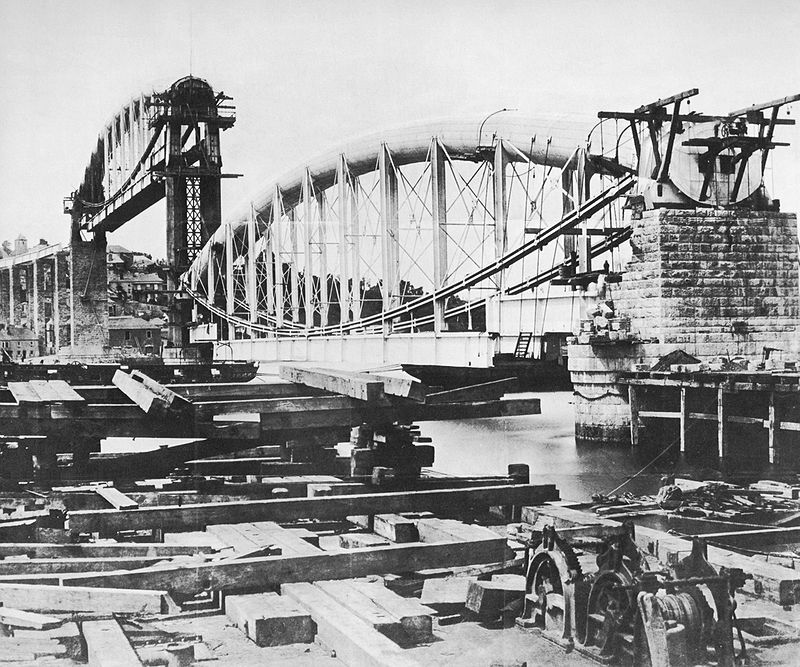
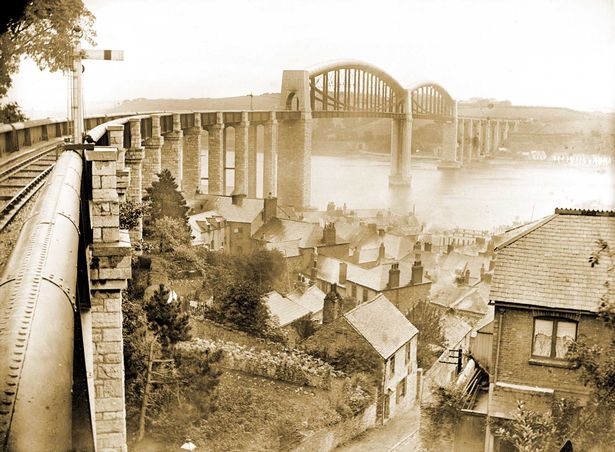
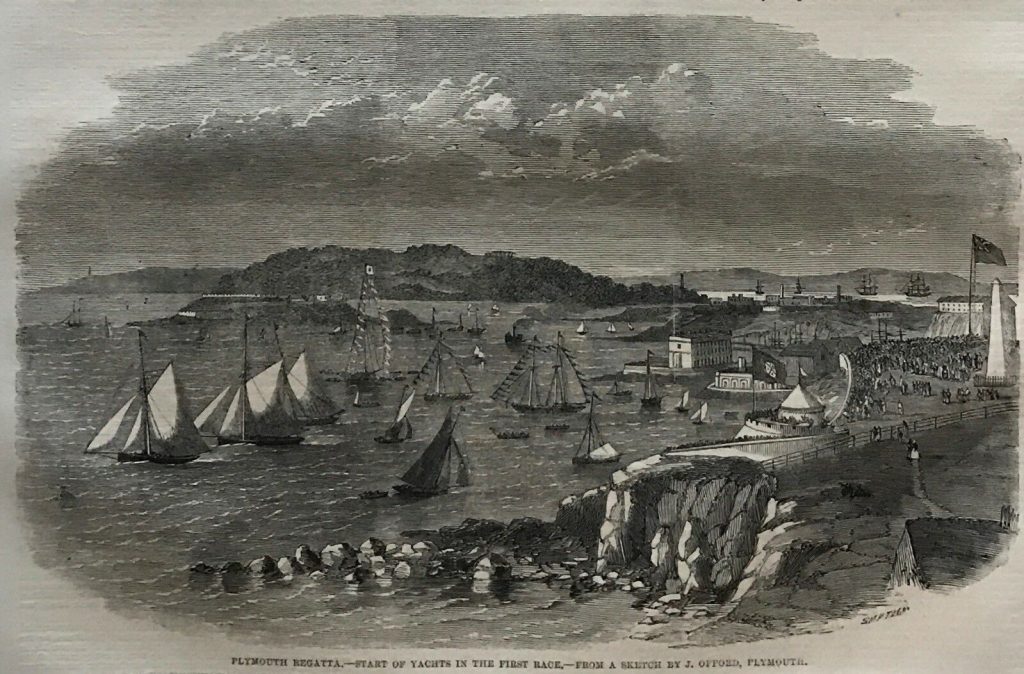
Over on the Island poorly paid soldiers were sometimes driven to petty crime in their desperation for an ale. In 1860 Gunner William Pickering had tried to pass counterfeit coins, two half crowns and a half sovereign to the Manager Charles Warren. He was arrested then tried at civilian court in October and found guilty. He was sentenced to 6 months imprisonment with hard labour. In the same year the girls went 3-2 up on the boys in the Routledge Family as Eliza C was born.
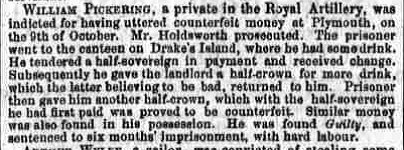
By the time of the 1861 Census the Kingdom of Italy had now come into being incorporating most of what we recognise today as Italy apart from Lombardy, Venetia (Venice) and the Papal States. Back home Plymouth had expanded to a population of nearly 69,000 making it the 8th largest town in England, there were nearly 50,500 living in Devonport and just over 14,000 in Stonehouse. Over on the Island work had started in March on the new Casemates, new Battery at the top of the Island and on the underground magazine and tunnel complex as recommended by the Royal Commission. The works had been tendered nationally and the contract was awarded to a Stonehouse Builders Hubbard and Sons.

The 1861 Census showed the Island was now garrisoned by 92 men in all, a Master Gunner, Joseph Fullarton, his assistant Gnr Beacham and a Royal Artillery detachment of 90 men. This was up from the 63 strong Garrison of 1851 which was drawn from the Infantry and Artillery. The 1861 detachment was drawn from the 3rd Brigade of the Royal Regiment of Artillery and led by 24 year old Irishman Lt Henry Bowen. He had under command Battery Sergeant Major John Donlan, another Irishman, two Sergeants, a Corporal (the rank hadn’t yet been replaced by the Artillery), a Bombardier (at the time equivalent of a Lance Corporal), 78 Gunners, five Drivers (the rank of Gunner and Driver had been separated although the Drivers wouldn’t have had horses on the Island) and a Trumpeter. Of the 92 there were 42 Englishmen recruited from 22 of the then 39 Counties, there were 37 Irishmen, 7 Scots, 3 Welsh and one each from Malta, Jersey and Canada who were all British Subjects. The records that I have traced show how common it was for soldiers to be discharged as unfit for common service. Common causes were Tuberculosis or other lung issues. Medical Officers commented on the soldiers ability to earn a living after discharge if they were medically to help make a decision if the soldier was granted or applied for a pension. Another striking feature is how often soldiers would be punished both by the Commanding Officer which would result in an entry in the Regimental Defaulters Book or by Court Martial. This had a bearing on the pay as extra money was awarded as good conduct badges were granted although they could just as easily be taken away if the soldier found himself in the defaulters book or tried by Court Martial. Although the Army did have schools there was no compunction to gain the school certificate although it does seem that to get promotion to Corporal was almost impossible if the soldier were unable to read and write although it was not yet a formal requirement.
Also on the Island was Charles Warren the Canteen Manager and Tennant with his family. Charles was the Canteen Manager at the time of the 1851 census. There were 11 families on the Island up one from the previous two censuses. The Master Gunner and his Assistant Gunner plus the Canteen Manager were all permanent posts and had a quarter allocated to them and 8 families from the Gunner detachment were also housed on the Island. The birth place of the children reflected the postings of the Gunners so included Ireland, Newfoundland in Canada, Antigua and Barbados in the Caribbean. One of the children, young Emma Watson only 1 year old had been born on the Island a year earlier to Gnr John Watson and his wife Emma. In all there were 118 people living on the Island, 99 males and 18 females. A full list of the detachment and families is below. Following the name is the year of birth though this is give or take a year as the census just gives an age not a date of birth. Their marital status at the time of the census and place of birth follows. If I have traced any other records of the soldier I list those to help out anyone who may recognise a name.
Lt Henry St John Cole Bowen; b 1837; Unmarried; born in Ireland. Henry was educated at the University of Dublin before enlisting and attending the Royal Military Academy at Woolwich. At the time Woolwich was the Academy for the Engineers and Artillery whilst Sandhurst was the Academy for all other cadet officers. He went on half pay in 1871. Half pay could be either voluntary or compulsory and meant the officer wasn’t required for service but was on the reserve list and could be called back at any time. Henry was back on full pay in 1872 and it may have been an agreed fixed term as Henry married in 1872 down at Hoo in Kent although I don’t have the details of his bride. It seems he was posted with his wife to Cork in Ireland as it was there he passed away aged 36 in 1874.
Battery Sergeant Major John Donlan; b 1827; Married; Ireland. At the time of the 1851 census John had been a Bombardier serving with the Gunners in Mauritius but there are no other records of him.
Sgt Gregory Grant; b 1832; Married; Malta. Gregory had enlisted around 1850 and was posted to the 4th Battalion in St Ann’s, Barbados as a Gunner/Driver in 1851. He married Margaret McGregor, a Cornish lass from Torpoint in 1860. Gregory continued up the ranks after his posting on the Island being promoted to Sgt by the end of 1861 and was now stationed in Corfu where their first two children were born. Alice was born first and a year later in 1863 Sydney was born. The family travelled with Gregory when he was posted to Montreal, Canada where during 1869 their third child, Lucy was born. By 1871 he was a Battery Sergeant Major with 3rd Brigade RA back out in the Caribbean, this time in Port Royal Jamaica. He left the regulars by 1873 when the next child came along. Mary was born in Swansea where the family had settled and Gregory was employed as a full time reservist Sergeant Major in the Militia. Their fifth child George was born in 1875 and the 1881 census records the family in Swansea. At this time Alice had left home, Sydney was training to be a teacher and the youngest three children were all scholars. By the time of the 1991 census Gregory, now 58 but still living in Swansea had been widowed. He had left the Militia and was now employed as a Builders Clerk. Alice had returned home and both she and Sydney were working as teachers. Lucy was looking after the home, Mary was training to be teacher and George was a stockbrokers Clerk. Ten years later in 1901 the only change is Mary has left home and George is a Shipbuilders Clerk. Gregory, now 68 is still working as a builders clerk. The 1911 census shows the family still in Swansea where Sydney passed away in 1905 but no cause of death is listed. George was now in the Mumbles, married to Evangeline with a year old son Donald. Mary found work as a teaching in Bootle and is unmarried. Alice is now a Headmistress and Lucy is looking after a retired Gregory who is now an Army Pensioner. Gregory passed away in 1918 at the ripe old age of 85.
Sgt William Wright; b 1834; Married; York, Yorkshire. The next we hear of William is in 1871 he has been promoted to Battery Sergeant Major and is serving alongside Gregory Grant in Jamaica with 3rd Brigade RA. I haven’t found any further records of William or Mary.
Cpl Charles Gray; b 1834; Unmarried; Romsey, Hampshire. Charles was still with 3rd Brigade in 1871 stationed in Barbados but I have no other details for him.
Bombardier Robert Duncan; b 1838; Unmarried; Tiverton, Devon. 3rd Brigade were deployed to Corfu and Malta after garrisoning the Island. Robert died on Malta during that deployment in 1862.
Gnr William Ball; b 1831; Unmarried; Manchester, Lancashire. William had a brief military career. He enlisted in 1859 at the relatively old age of 28 and was discharged in 1861 as unfit for service due to epilepsy.
Gnr Robert Bielby; b 1843; Swansea, Glamorganshire, Wales. Robert enlisted in 1861 and his first posting after training was to 3rd Brigade and the Island. He was the first recorded Bielby on a Census in both Plymouth and Devon!! He had quite an eventful career having been in the defaulters book twenty times for minor offences and court martialled three times all of which ended up with spells of imprisonment. Robert spent the majority of his service abroad in Corfu and Malta with 3rd Brigade then after one his spells in Jail he was transferred to 4th Brigade who he served with in Canada and India. He was discharged as medically unfit for service after an accident when he fell from a waggon and his left leg was broken by the wheel. He ended up with a compound fracture of his left leg which must been incredibly painful and proved difficult to set as it left him with a deformity. Whilst I’m not sure of his exact movements after he was discharged it seems he was in Cardiff and then Exeter for a while before settling in Plymouth in 1877. A year later he married Harriet Shellebeer (there may be a few variations in the spelling) a Devonian lass from Ashburton which lies roughly half wat between Exeter and Plymouth. By the time of the 1881 census Robert is working as a Coachman. He and Harriet are living at Earl’s Acre Cottage in Stoke Damerel and have two young sons, Robert John aged 2 and 1 year old George Andrew. The family must have moved soon after to Charmouth, Dorset where their third child Guy Rein born in 1883 then onto Cockington near Torquay where Mary A was born. The family was back in Plymouth at 7 Skardon Court where Bessie was born in 1888. On the 1891 Census Robert somewhat bizarrely lists himself as born “On the High Seas” instead of Swansea and is working as gardener. All five children are at school. They had another son, Frederick in 1892 before Robert died in 1895. Harriet who was 10 years his younger remarried to William Dryden, a Royal Engineer stationed in Plymouth, and they had a daughter, Dorothy in 1890. The family was still in Plymouth living at 1 Gloucester Lane with the three youngest of the Bielby children during the 1991 census. Robert John had enlisted in the Royal Garrison Artillery in 1896 and George Andrew had followed him into the Royal Artillery two years later in 1898. I’ve not followed up on the Bielby Clan after this but Robert John and Guy were both in Plymouth, married with families in 1921 and Bessie was a widow in the 1939 Register also living in Plymouth. The interesting thing as I mentioned earlier is I can’t find any Bielby in Devon let alone Plymouth before Gunner Robert Bielby so it may be that the Devon Bielby’s are mainly descendants of his. Of course just because the census didn’t record any other Bielby’s that didn’t mean he was the only one but it does increase the probability of any current Devon Bielby’s being descended from Robert.
Gnr Joseph Benson; b 1841; Unmarried; Ireland.
Gnr Joseph Boyd; b 1839; Unmarried; Scotland.
Gnr Joseph Broadhurst; b 1838; Unmarried; Burton. Leicestershire.
Gnr Michael Byrne; b 1838; Unmarried; Ireland.
Gnr James Cain; b 1839; Unmarried; Ireland. James enlisted in 1860 and only had a brief military career. He served in Corfu after being on the Island and was discharged after 4 years as unfit for service in 1864. The reason given was epilepsy exacerbated by drink. As with William Ball epilepsy wasn’t seen as a hindrance to employment so he wasn’t granted a pension. His discharge papers stated his intention was to live in Edinburgh but I can’t find any definitive later records of James.
Gnr William Campbell; b 1834; Unmarried; Ireland.
Gnr Thomas Caulfield (possibly Cantfield); b 1835; Unmarried; Ireland.
Gnr Patrick Daley; b 1834; Unmarried; Ireland.
Gnr Albert Delahunt; b 1842; Unmarried; Ireland. Albert enlisted in October 1859 and after his stint in Plymouth and on the Island he stayed with 3rd Brigade. During the 1871 census he was still serving as a Gunner in Halifax Nova Scotia and was discharged in 1879 as Incorrigible although there is no indication of exactly why he was incorrigible although I wouldn’t be surprised if drink played a part!!
Gnr James Donaldson; b 1842; Unmarried; Ireland. Dubliner James enlisted at 17 years old and enjoyed a full career of 22 years before being discharged as a Master Gunner 1st Class in Quebec, Canada in 1882. Interestingly his medical record shows he was vaccinated against smallpox in 1859 when he enlisted. The smallpox vaccination had been compulsory for all babies since 1853 so it seems the Army was vaccinating all unvaccinated recruits or at least offering them the vaccine. He was promoted to Bombardier shortly after leaving the Island as he deployed with 3rd Brigade to Corfu and Malta for the next 3 years during which he was promoted to Corporal. Back in Britain he married Elizabeth Lambert in 1865 and was stationed at Woolwich when their first of seven children, William Alfred was born. James was promoted to Sergeant in 1868 and the family was posted to Halifax, Nova Scotia. During the next two years where Lizzie Ann and Robert Loggie were born in 1868 and 1869 respectively. The family returned to Britain and were posted to the Isle of Wight in 1870 for another two year posting and Isabelle Margaret was born in 1872. James was promoted to Master Gunner and the family headed back to Canada, this time to Quebec where the family would stay until James was discharged. Charlotte Rachel in 1875, Elfrida Mary in 1877 and Janet Oraig in 1881 completed the family. The family stayed in Canada settling in Kingston Ontario initially before moving to Russell in the same State. James was still alive at the time of the 1911 census although it looks as if Harriet had passed away and he had remarried.
Gnr Christopher Donelly; b 1837;Unmarried; Ireland.
Gnr Eugene Downey; b 1835; Unmarried; Ireland.
Gnr Frederick Elliott; b 1838; Unmarried; Loughborough, Leicestershire.
Gnr Thomas Fletcher; b 1836; Unmarried; Ireland.
Gnr John Freeman; b 1839; Unmarried; Kingston, Surrey.
Gnr Joseph French; b 1841; Unmarried; Ireland. Joseph enlisted in 1859 and after his first posting to Plymouth and the Island in 1861 deployed with 3rd Brigade to Corfu and Malta before being posted to Canada. He then ended up in Jamaica before being posted to Gibraltar where he was discharged in 1880 never having been promoted. He was never court martialled either though did have 7 entries in the defaulters book. His intended place of residence was listed as the Queen’s Arms in Woolwich though it doesn’t say what side of the bar he was intending to reside!! Joseph did go back to Woolwich but ended up as the butler to Lt Col Hugh Chichester of the Royal Artillery. At the time of the 1881 census he was still listed as the Butler and had married. His wife Elizabeth is recorded as the Laundress. They had one child, Florence in 1881 before Elizabeth died in 1883. Joseph remarried almost immediately to Ellen Bletchley with who he had three children, Josephine, James and William born in 1885, 86 and 87 respectively. The 1891 census shows the family living at Eglington Road, Plumstead with Joseph now employed as Gentleman Cadet Servant at the Royal Military Academy Woolwich where Engineer and Artillery Officers were trained. Joseph passed away before the 1901 Census but Ellen was still living in Plumstead with her children, all of whom were now working.
Gnr George Glendinning; b 1839; Unmarried; Ireland. George enlisted in 1858 and was discharged in 1879 after 21 years service at the end of his engagement. He had deployed abroad to Corfu, Malta, Canada and Bermuda during his career and reached the rank of Bombardier twice but was bust back to Gunner both times and although he was never court martialled he did appear in the Regimental defaulters book 5 times. There is no record of him ever marrying and his intention was to settle in County Tyrone in Ireland though I can’t trace him after he was discharged.
Gnr Thomas Glendinning; b 1837; Unmarried; Ireland. Although it seems likely Thomas was related to George I can’t find anything that confirms that nor can I say for certain what happened to him.
Gnr Thomas Gray; b 1841; Unmarried; Ireland. Thomas enlisted in 1859 and was discharged as unfit for service 5 years later in Malta with Tuberculosis. His medical discharge stated it was worsening and as a result he was unlikely to be fit enough for any kind of work.
Gnr George Grey; b 1826; Married; Newcastle upon Tyne; Northumberland. George enlisted in 1848 and served 20 years until he was discharged at the end of his term of engagement in 1868. By then he had married Margaret with whom he had one child, Catherine, who was born in Guernsey in 1856. He had also served abroad in Ceylon, China, Barbados, Corfu and Malta. He appeared in the defaulters book five times which wasn’t unusual but was never court martialled. He was never promoted during his career and did receive a pension on discharge. He intended to settle back in Newcastle but I can’t find any further trace of him or the family.
Gnr Henry Gunn; b 1839; Unmarried; West Ham. Essex. There is only a little detail on Henry. He was discharged in 1861 it seems medically as he was given a one off pension payment but outside of that I have no other trace of him.
Gnr Patrick Holland; b 1834; Unmarried; Ireland.
Gnr Thomas Heaton; b 1829; Unmarried; Hexham Northumberland. Thomas enlisted in 1848 and served for 16 years, half of which was in the West Indies. His conduct on discharge in 1862 was described as very bad, which is unsurprising as he we court martialled and convicted 5 times as well as having 41 entries in the Regimental defaulters book which was excessive even in those days. His punishments were not only imprisonment but included the forfeiture of his pension. The reason for discharge was distorted feet. According to the medical report whilst posted to Devonport he was cleaning the top of a wall surrounding the fort when he slipped and fell injuring both ankles and spent 12 weeks in hospital. He was left behind when 3rd Brigade deployed to Corfu and Malta so the fort may well have been the one on Drake’s Island. After being discharged Thomas moved back to his home town of Hexham where he found work as a labourer and sweep and married Mary Smith from Appleby in 1865 with whom he had a daughter Hannah in 1868. Mary also worked as a charwoman. They were both still working in Hexham in 1881 by which time they had another three children, Mary A, Elizabeth and Thomas in 1874, 1878 and 1881 respectively.
Gnr William Holt; b 1837; Unmarried; Ireland.
Gnr John Kenney; b 1841; Unmarried; Blabey, Leicestershire.
Gnr James Kennison; b 1843; Unmarried; St Germans, Cornwall. James enlisted in 1860 and was posted to 3rd Brigade in February 1861 and was part of the detachment on the Island. However not long after he started to have epileptic fits. After examination by a medical board in June 1861 he was discharged as unfit for service due to the frequency of his fits which the medical report stated were caused by constitutional infirmity. He was adjudged to be able to earn a living and intended to live in Devonport after discharge but there is no further record of him.
Gnr Henry Kilby; b 1840; Unmarried; Rotherhithe, London. Henry enlisted in 1859 but was discharged after two years in 1861 due to impaired vision in both eyes which was worsening. Despite this, as with many other medical discharges Henry was declared able to earn a living. Henry did have an eventful couple of years having made it into the defaulters book three times and having absented himself for duty was court martialled and jailed for 12 days. I can’t find any record of him after his discharge.
Gnr John Lauder; b 1831; Married; Scotland. John enlisted in 1855 and in between punishments, he appeared in the defaulters book 34 times and was court martialled 4 times, he served in Corfu, Malta, Canada and Barbados. He was discharged as medically unfit in 1873 after 16 years with the Colours. He intended to live in Brechin with his wife Henrietta. His son William would have been 21 by then so it isn’t clear if he had left home by that stage and there is no further record I can find of the family.
Gnr James Mann; b 1829; Unmarried; Leith, Scotland. James enlisted in 1848 aged 20 and served for 14 years. He was posted for 8 years to Barbados and also served overseas in Corfu. Indifferent was the word used to describe his conduct as he was court martialled five times and jailed on each occasion as well as getting himself 47 entries in the Regimental defaulters book. He was discharged as unfit for service with a rupture in both groins though was considered able to contribute something towards a livelihood. I can’t trace him after he was discharged.
Gnr James Marley; b 1839; Unmarried; Longbenton, Northumberland.
Gnr James Martin; b 1841; Unmarried; Ireland. James served for almost 5 years after enlisting in 1859. He was posted with 3rd Brigade to Corfu after his stint on the Island where he contracted what Tuberculosis. Unfortunately the condition worsened and he was discharged in 1864 as unfit for service and would unikely be fit for any active employment. His conduct was good having only 5 entries in the defaulters book but was jailed for one of those offences for 3 days. Commanding Officers had the powers to sentence soldiers to jail for limited periods, up to 28 days, for certain offences. James intended to live in Dublin after discharge but I can’t find any further records.
Gnr John McGough; 1837; Unmarried; Ireland.
Gnr Robert McMahon; 1841; Unmarried; Ireland. Robert originally enlisted in the Armagh Militia but transferred to the Royal Regiment of Artillery in 1859. He served for over 21 years and discharged as of right at the end of his engagement. He deployed abroad to Corfu, Malta, Canada and Jamaica and only had 4 entries in the defaulters book. He didn’t obtain an Army School certificate meaning which probably accounts for his lack of promotion. His conduct was very good on discharge and he intended to go back to Portadown in Armagh to live. There is a Robert McMahon listed in the 1901 Census as living in Portadown as married to Harriet with a 15 year old daughter, also called Harriet, but I can’t say with any certainty if it is the same person.
Gnr Thomas McGlynn; b 1838; Unmarried; Ireland.
Gnr Joseph McKendrey; b 1832; Unmarried; Ireland. Joseph enlisted in 1860 and served for 5 years the majority of it in Corfu and Malta where he was discharged as unfit for further service. The reason given was paralysis which was worsened by the climate. He was judged as possibly able to earn a living if the condition regressed with a change in climate. His conduct was described as bad with 23 entries in the defaulters book which resuted in 2 short spells in jail and was court martialled 4 times all of which resulted in a spell in the glasshouse. Joseph intended to live in Woolwich but I can’t find any further records of him.
Gnr James McQuillan; b 1832; Unmarried; Ireland.
Gnr William McQuillan; b 1836; Unmarried; Ireland. William originally enlisted in the Queen’s Royal Antrim Rifle Regiment of Militia in 1855 and transferred to the Royal Regiment of Artillery a year later. He went on to serve for a further 14 years including postings to Corfu, Malta and Canada before being discharged as unfit for service in 1870. His conduct was deemed Very Good and he only had 6 entries in the defaulters book. He was discharged with Tuberculosis which was found to be so bad he would be unable to earn a living. On this basis he was granted a pension and settled in Belfast. Unfortunately William passed away within a year of being discharged in 1871.
Gnr John Mills; b 1837; Unmarried; Ireland.
Gnr John Morris; b 1840; Unmarried; Ireland.
Gnr George Morton; b 1841; Unmarried; Upworth Cambridgeshire. George was still with the Royal Artillery in 1871 when he was listed with 3rd Brigade in Canada but I can’t trace him after that.
Gnr Alfred Moseley; b 1843; Unmarried; Worcester, Worcestershire.
Gnr John Mylerest; b 1836; Unmarried; Douglas, Isle of Man.
Gnr William O’Brien; b 1843; Unmarried; Prince Edward Island.
Gnr Jeremiah O’Callaghan; b 1837; Unmarried; Ireland. The only later record of Jeremiah is the 1871 census where he is listed as an unmarried Sergeant in the Royal Artillery living in Barracks in Plymouth.
Gnr Joseph Phillips; b 1837; Unmarried; Ireland.
Gnr James Quinlan; b 1835; Unmarried; St Johns, London. James enlisted in 1860 and went with 3rd Brigade to Corfu and Malta after their period in Devonport and on the Island. He was another who was in constant trouble having racked up 28 entries in the defaulters book and having been court martialled 4 times in the 6 years he served before being discharged in 1866 as unfit for further service. In his case it was a double rupture but he was adjudged to be able to earn a livelihood. Although he intended to live on Vine Street in Westminster I can’t find any further record of him.
Gnr John James Rafferty; b 1836; Unmarried; Ireland. It seems John died a year after the census in 1862 from consumption (now known as Tuberculosis).
Gnr Robert Ramsey; b 1831; Unmarried; Ireland. Robert enlisted at 20 years old in 1859 and served for 21 years before being discharged as of right at the end of his engagement in 1880. He had been promoted to Bombardier in 1864, Corporal in 1866 and finally to Sergeant in 1871. His conduct was described as Very Good and unusually not only had he never been court martialled by he had no entries in the defaulters book either. Perhaps this was due to his marriage to Mary, a Jersey lass, with whom he had a daughter Mary A in 1867 whilst they were posted to Newfoundland, Canada. He had previously been posted to Corfu and Malta and would subsequently be deployed to Jamaica, Halifax Nova Scotia and Bermuda. He intended to reside in Antrim after discharge but I don’t have any further record of the family.
Gnr William Ransom; b 1842; Unmarried; Bury St Edmonds, Suffolk.
Gnr Michael Read; b 1836; Unmarried; Scotland.
Gnr Charles Reid; b 1840; Unmarried; Poole, Dorsetshire.
Gnr Edward Rickwood; b 1836; Unmarried; Leicester, Leicestershire. It seems likely that Edward was discharged before the 1871 census and joined the Metropolitan Police. He married Elizabeth with whom he had two children, Arthur and Alice by the 1881 census. He left the Police and was running a Pub in Hertfordshire 1891 and then became a Wharf Manager before retiring with Elizabeth to Elham in Kent. Edward passed away in 1912 and Elizabeth in 1929.
Gnr James Risebrook; b 1837; Unmarried; St Georges Colgate, Norwich, Norfolk. James had also been discharged by the next census in 1871 by which time he had married Charlotte in 1867 and joined the Norfolk Constabulary as a Police Officer. James retired by 1891 and passed away a few years later in 1894.
Gnr John Riseley; b 1834; Married; Carlton, Bedfordshire. John enlisted in 1855 and served with the Royal Artillery serving posted to the West Indies, Corfu and Malta. At the end of his engagement with the Artillery in 1867 he transferred into the Military Store Staff Corps and was stationed in Woolwich when it became the Army Service Corps. He was discharged as of right with a pension in 1876 when his term of engagement finished. His conduct was Very Good never having been Court Martialled and only twice appearing in the defaulters book. John had also got his school certificate. He intended to live at Gibraltar Farm in Chattenden Kent but I can’t place him with any certainty on any later records.
Gnr Lewis Ritchie; b 1841; Unmarried; Shankill, Ireland. Lewis enlisted in 1859 and deployed with 3rd Brigade after they left the Island to Corfu and then Malta where he was discharged as unfit for service in 1865. The reason was not uncommon a breathing or lung problem in his case chronic bronchitis which he developed whilst abroad. The medical officer felt the condition would worsen hampering his ability to earn a living. Lewis went back to Belfast and passed away a few years later in 1867 aged just 26.
Gnr George Scott; b 1835; Unmarried; London. George served for 10 years after enlisting in 1859. Around half was spent abroad in Corfu, Malta and Canada. He reported sick in Canada and was found to have Tuberculosis and was discharged as unfit for service in 1869. The condition was severe and such that the Medical Officer assessed that he would be unable to make a living. His conduct was Indifferent with 20 entries in the defaulters book, two of which resulted in jail, and was twice tried, convicted and imprisoned at court martial. George intended to live in Highgate, London but I can’t locate him with any certainty after his discharge.
Gnr George Smith; b 1837; Unmarried; London.
Gnr Thomas Smith; b 1842; Unmarried; Ireland.
Gnr Francis Swap; b 1838; Unmarried; Blackwall. London.
Gnr Thomas Tasdale; b 1830; Unmarried; Harwarden, Flintshire. The only record I can find of Thomas was he was discharged in 1867 and died in 1868. He was drawing his pension in London at the time.
Gnr John Thompson; b 1841; Unmarried; St Sepulcher, London.
Gnr Edwin Venn; b 1837; Unmarried; Newport, Monmouthshire. Edwin served for 7 years after enlisting in 1853. He spent part of it abroad in the West Indies and Corfu before being discharged as unfit for service in 1862 whilst in Corfu. The Medical Officer gave the reason as disease of the lungs and commented he would be unable to earn a living. He was initially given a pension for 1 year. His character was described as Indifferent after appearing in the defaulters book 29 times and was tried, convicted and jailed 5 times by court martial. Edwin intended to live in Newport after discharge which is where the disease progressed and he passed away in 1864.
Gnr John Watson; b 1821; Married; Ireland. The only record I can find of John is the 1861 Census. He is listed as married to Emma with whom he had a daughter also called Emma in 1860 who was born on the Island. I can’t trace either of the Emma’s after 1861 either.
Gnr John Weir; b 1830; Unmarried; Ireland.
Gnr William Webster; b 1839; Unmarried; Bodmin, Cornwall.
Gnr William Wellaway; b 1829; Unmarried; Alphington, Devonshire.
Gnr Christopher Wheller; b 1829; Married; Cullompton, Devon. Christopher enlisted in 1846. One of his first postings was to Ireland where he met and married Mary Ann in 1850. They had been posted to the West Indies where they had 3 children, Francis Alfred in Barbados during 1852 then Christopher Henry in Antigua during 1856 and lastly back in Barbados Frances was born in 1857. They returned to Plymouth and in 1860 baby John was born. The 1861 census records them in a married quarter on the Island. Baby Ellen came along a year later in 1862 and Christopher was discharged at Woolwich after 21 years Exemplary service in 1868. Mary Ann seems to have kept him out of mischief for the most part as he only appears in the defaulters book eight times. The family settled in the Woolwich area after Christopher was discharged and he found work as a Coachman and Groom. By the 1871 census they had another two children Mary Ann and Frederick in 1869 and 1870 respectively. They had another three children in the following decade, Rose (1874), William (1876) and Christina (1875). Christopher continued working as a Coachman and Groom before retiring not long before the 1901 census. Both Christopher and Mary Ann were still living together into their 80’s by the time of the 1911 census. Christopher passed away in 1913 and Mary Ann in 1921.
Gnr John White; b 1827; Unmarried; Scotland.
Gnr Robert White; b 1833; Unmarried; Kilwinning, Ayrshire.
Gnr Thomas Wilkins; b 1842; Unmarried; Plympton, Devon.
Gnr John Wilkinson; b 1840; Unmarried; Manchester, Lancashire. John enlisted at Plymouth in 1861 after having left the Navy. He received a splinter wound in the thigh in the Baltic but I can’t trace his full Navy record. John was posted with 3rd Brigade to Corfu, Malta before a spell in jail at Woolwich after being convicted by Court Martial. He was then posted to 4th Brigade and was sent to Canada. He contracted Tuberculosis there and was discharged in 1866 after just under 5 years service. The disease was judged that severe he was not able to earn a living in the Medical Officer’s opinion. His conduct was judged to be Very Bad on account of his 26 entries in the defaulters book and the 5 times he was court martialled. John intended to live in Belfast after his discharge but I can’t find any further record of him.
Gnr Richard Wilson; b 1839; Unmarried; Preston, Lancashire.
Gnr William Wilson; b 1837; Unmarried; Riccarton, Ayrshire.
Gnr Alfred Woodruff; b 1830; Unmarried; Stockport, Lancashire.
Gnr Walter Woods; b 1835; Unmarried; Somerset.
Gnr Henry Young; b 1831; Unmarried; Dover, Kent. Henry enlisted in late 1860 and was stationed on the Island at the time of the 1861 census. He subsequently went with 3rd Brigade to Corfu and Malta after which he was posted to Canada. In common with a number of other Gunners he caught Tuberculosis whilst in Canada and was discharged as unfit for service in 1869. The Medical Officer assessed that he could partially contribute to earning a living. His conduct on discharge was Bad having amassed 33 entries in the defaulters book and been tried, convicted and jailed by Court Martial 5 times. I can’t trace him after his discharge.
Dvr Samuel Greenslade; b 1838; Unmarried; Churtonleigh, Devon. There is only a pension record for Samuel which shows he was discharged by 1865 and drawing his pension in Taunton. He is shown as having passed away in 1869.
Dvr Thomas Hughes; b 1839; Unmarried; Higher Everton, Liverpool.
Dvr James Routledge; b 1843; Unmarried; Ireland.
Dvr Thomas Taylor; b 1838; Unmarried; Kettly, Shropshire.
Dvr Edward Western; b 1840; Unmarried; Churtonleigh. Devon. Edward enlisted as a Driver at Plymouth in 1861 and was on the Island during the census in April. Immediately after the census he was transferred and spent the remainder of his career as a trumpeter in India. He was discharged as unfit in 1979 with a double hernia that the Medical Officer felt would affect his chances of earning a living. His conduct was Very Good with no entries in the defaulters book and he was never court martialled both something of a rarity for the times. Edward intended to live in Devon after his discharge but there is no further record I can find.
Trumpeter Alfred Harris; b 1844; Unmarried; Woolwich, Kent. Alfred enlisted as 14 year old Trumpeter in 1858. He served as Trumpeter until 1865 when he trained as a Gunner. He served in Corfu, Malta, Canada and Jamaica as well as in Great Britain before being discharged as unfit for service in 1876. The problem was a disability in his left leg but it was not thought serious enough to prevent him earning a living. His conduct was Very Good and he only appeared in the defaulters book 5 times and was never court martialled. Alfred settled in Southampton after being discharged where he worked as a Railway Porter and married Elizabeth in 1879. They had 2 children, Winifred in 1887 and two years later Edward. They were still together and living in Southampton when Alfred passed away in 1917.
Master Gunner Joseph Fullarton; b 1815; Married; Jersey. Joseph enlisted as a Drummer Boy in 1829 aged 14. In 1832 when he was eligible for man service he was recorded as a Gunner. He was promoted to Bombardier in 1838 then Corporal in 1843 and a few years later in 1846 to Sergeant. During service abroad in Newfoundland he had married Louisa and they had their first two children, Charlotte and Louisa Kate before Joseph was promoted to Master Gunner in 1852. A year later in Kent their third child, a son Hamilton James was born. His last posting was on the Island and he was discharged after 34 years service in 1868 having spent at least 7 years on the Island. After discharge the family went to live in London. Joseph became a Park Keeper at the Royal Hospital Chelsea. Charlotte was employed as a live in Housemaid for Colonel Campbell of the Royal Artillery before marrying in 1874. Hamilton followed his father into the Royal Artillery and married Beatrice Marsh in 1899. Joseph resigned as a Park Keeper in 1882 and lived off his pension with his wife Louisa. They are listed in the 1891 census as living with their second child Louisa Kate and her husband William Peters a Railway Station Manager in Wallingford, Berkshire. Joseph passed away in 1896 at the age of 81.
Gnr William Beacham; b 1825; Married; Lincolnshire. I only have one other record for William, the 1901 census which records him still living with his wife Mary Ann in Paignton, Devon. At 75 he was still working as a general labourer. I have further record of them after 1901.
Charles F Warren Canteen Tennant; b 1822; Married; Devonport, Devonshire. Charles took over the Canteen after it was offered for let following Mr Couch disappearing as he was wanted for the brandy smuggling incident in 1850. With him was his wife Elizabeth and daughter Louisa. He was still the Canteen Manager and living on the Island during the 1861 census by which time his wife had given birth to a second daughter, Mary Ann in 1854. However by the 1871 Census the family is living in Stonehouse where Charles is working as a boot maker. Both his wife Elizabeth and daughter Mary Ann are working as seamstresses suggesting it may have been a family business. The eldest daughter, Louisa has moved out. Elizabeth died in 1876 and in 1881 Charles is living alone but still working as a boot maker. Charles died in 1890.
Families on the Island
Master Gunner Joseph Fullarton; b 1815; Married; Jersey
Louisa Fullarton; b 1817; Married; British Subject born Overseas
Charlotte Fullerton; b 1848; Scholar; Newfoundland
Kate Fullarton; b 1851; Scholar; Newfoundland
Hamilton Fullarton; b 1853; Scholar; Plymouth, Devon
Gnr William Beacham; b 1825; Married; Lincolnshire
Mary Ann Beacham; b 1833; Married St Austell, Cornwall
BSM John Donlan; b 1827; Married; Ireland
Mary Donlan; b 1826; Married; Ireland
John Donlan; b 1859; Ireland
Sgt Gregory Grant; b 1832; Married; Malta
Margaret Grant; b 1837; Married; Torpoint, Cornwall
Sgt William Wright; b 1834; Married; York, Yorkshire
Mary Wright; b 1839; Married; Plymouth, Devon
Gnr George Grey; b 1826; Married; Newcastle upon Tyne; Northumberland
Margaret Grey; b 1825; Married; Northumberland
Catherine Grey; b 1856; Guernsey
Gnr John Watson; b 1821; Married; Ireland
Emma Watson; b 1829; Married; Stoke Damerel, Plymouth, Devon
Emma Watson; b 1860; St Nicholas Island, Plymouth, Devon
Gnr John Lauder; b 1831; Married; Scotland
Henrietta Lauder; b 1829; Married; Brewood, Staffordshire
William Lauder; b 1852; Scotland
Gnr John Riseley; b 1834; Married; Carlton, Bedfordshire
Jane Riseley; b 1843; Married; Cardiff, Wales
Gnr Christopher Wheller; b 1829; Cullompton, Devon
Mary Ann Wheller; b 1832; Married; Ireland
Francis Alfred Wheller; b 1852; Barbados
Christopher Henry Wheller; b 1856; Antigua
Frances Wheller; b 1857; Barbados
John Wheller; b 1860; Plymouth, Devon
Charles F Warren Canteen Tennant; b 1822; Married; Devonport, Devonshire.
Elizabeth R Warren; b 1824; Married; Devonport, Devonshire
Louisa Warren; b 1846; Scholar; Devonport, Devonshire
Mary Ann Warren; b 1854; Scholar; Devonport, Devonshire
Mary Ann Smesage; b 1844; House Servant; Ugborough, Devon

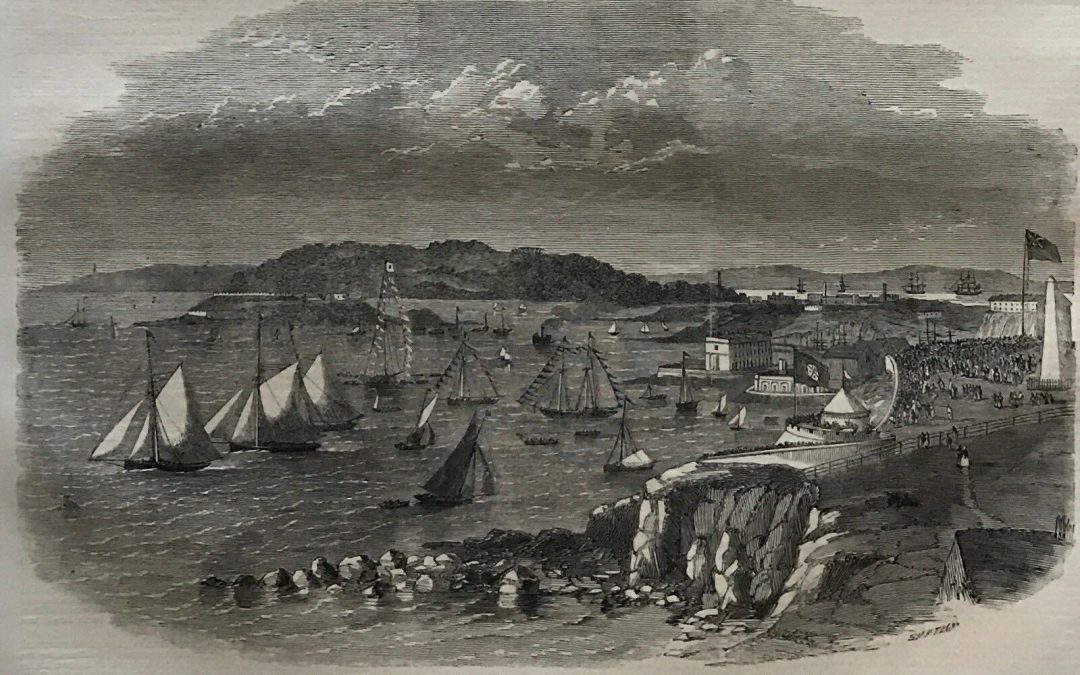
Wow so much history! Can’t believe that many people had lived on the island. Great bringing these people to life
Hi Myra, thanks, glad you are enjoying the blogs. It gets even more interesting as the Routledge family grows and the children grow up, marry and have their own kids. Next blog in a couple of weeks.